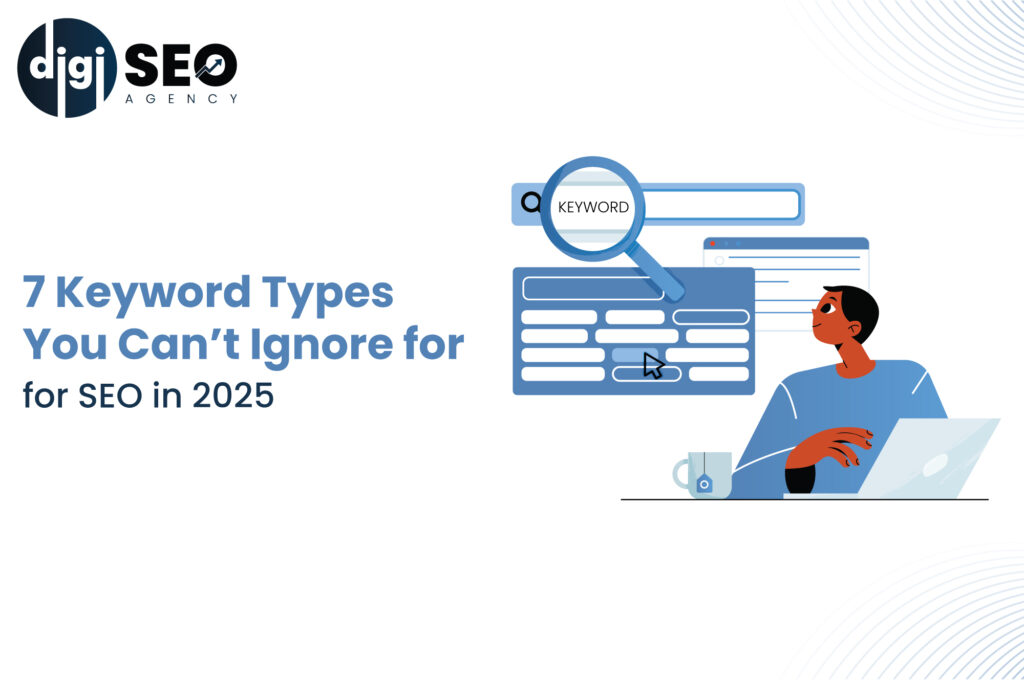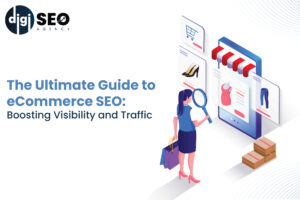In digital marketing, choosing the right keywords is essential for increasing your website’s visibility. Keywords are the search terms people use to find information, products, or services online. By targeting the right keywords, you can attract a more relevant audience, boost your search engine rankings, and make your content easier to find.
In this blog, we’ll explore seven types of keywords that will help you optimize your SEO strategy in 2025. Understanding these different keyword types from broad terms to highly specific phrases will allow you to better connect with your audience and enhance your online presence.
How Many Types of Keywords Are There in SEO?
Keywords are critical to improving your website’s search engine ranking and driving traffic. However, not all keywords are the same. Each keyword type serves a unique purpose. Let’s break down these different keyword categories and how they can impact your SEO strategy.
1. Intent-Focused Keywords
Intent-focused keywords are centered around understanding what users want to achieve when they search online. These keywords reflect the user’s intent, whether they’re looking for information, navigating a website, or preparing to make a purchase. Broadly, intent-focused keywords fall into four categories:

Want results-driven SEO?
Learn MoreInformational Keywords
Informational keywords are used when people are seeking answers or information. These searches often include phrases like “how to,” “what is,” or “tips for.” While these keywords may not always lead to immediate sales, they help build your authority and establish trust with your audience.
Examples:
- How to improve SEO
- What is digital marketing?
Navigational Keywords
Navigational keywords are used by individuals who are already familiar with a brand or website and who want to navigate directly to it. These searches typically involve company names, specific product names, or services, and are effective for driving traffic to well-established brands.
Examples:
- SEO company Ahmedabad
- Flipkart
Commercial Keywords
Commercial keywords target users who are comparing options or exploring products/services before making a purchasing decision. They signal that the user is in the research or evaluation phase.
Examples:
- Best SEO tools for content writing
- iPhone vs. Samsung Galaxy reviews
Transactional Keywords
Transactional keywords indicate that the user is ready to make a purchase or take action. These keywords are highly valuable when paired with paid ads or optimized landing pages.
Examples:
- Buy SEO course online
- Subscribe to digital marketing newsletter
2. Keywords Based on Length
Short-Tail Keywords
Short-tail keywords are brief, usually made up of one or two words. They are highly searched but tend to be broad and competitive. While they can drive significant traffic, ranking for them can be challenging due to their generic nature.
Examples:
- SEO
- Digital marketing
Long-Tail Keywords
Long-tail keywords are more specific and typically consist of three or more words. While they attract fewer searches, they are easier to rank for and often lead to higher conversion rates due to their targeted nature.
Examples:
- Best SEO tools for beginners in 2025
- How to improve local SEO for small businesses
Medium-Tail Keywords
Medium-tail keywords are more specific than short-tail keywords but not as long as long-tail keywords. These terms typically contain three words and strike a balance between search volume and competition, making them a valuable tool for driving targeted traffic.
Examples:
- SEO training for small businesses
- Online SEO courses for beginners
3. Keywords Based on Selection
Primary Keywords
Primary keywords are the main terms you want to rank for. They define the core theme of your webpage and are usually the central focus of your content.
Examples:
- Digital marketing course
- SEO for beginners
Secondary Keywords
Secondary keywords support the primary keywords by providing more context and refining the topic. These terms are closely related to your primary keyword and help make your content more relevant to search engines.
Examples:
- Online digital marketing classes
- SEO strategies for small businesses
Secondary-Secondary Keywords
These keywords combine both primary and secondary keywords, creating more niche, specific topics. They’re particularly useful for targeting specialized audiences within your content.
Examples:
- How to become an expert in digital marketing
- Best SEO strategies for eCommerce websites
4. Seed Keywords
Seed keywords are the foundation of any keyword research process. These broad terms are usually general words related to your business or industry. They help generate ideas for more specific keywords.
Examples:
- Education
- Marketing
5. LSI Keywords (Latent Semantic Indexing)
LSI keywords are related terms that search engines use to understand the context of your content. These aren’t just synonyms, but words frequently associated with your primary keyword that help search engines assess relevance.
Examples: If your primary keyword is “SEO,” LSI keywords could be “search engine optimization,” “link building,” or “content marketing.”
6. Branded Keywords
Branded keywords include the name of a specific company or product. Users searching for branded keywords are looking for a particular brand and its offerings. These keywords are essential for businesses with strong brand recognition.
Examples:
- Nike shoes
- Apple MacBook
7. Other Types of Keywords
Niche Keywords
Niche keywords target a very specific group of users. Though these keywords may have lower search volumes, they’re highly relevant to a particular audience, making them valuable for businesses serving niche markets.
Examples:
- SEO course for healthcare professionals
- Digital marketing for real estate agents
Competitor Keywords
Competitor keywords are terms that your competitors are ranking for. By analyzing these keywords, you can uncover gaps in your own SEO strategy and optimize your content to compete more effectively with similar websites.
Examples:
- Competitor’s name + reviews
- Competitor’s products or services
Conclusion:
Not all keyword types will be relevant to every piece of content you create, but each serves an important role in an effective SEO strategy. The key is to choose keywords that align with your content’s purpose and the needs of your audience. By combining primary, secondary, long-tail, branded, and niche keywords, you’ll enhance your SEO efforts, boost search rankings, and drive more targeted traffic to your site.
Additionally, if you’re looking for expert assistance, partnering with a trusted SEO company in Ahmedabad or a top-rated digital marketing company in India can help you build a robust SEO strategy, attract the right audience, and elevate your online presence.




